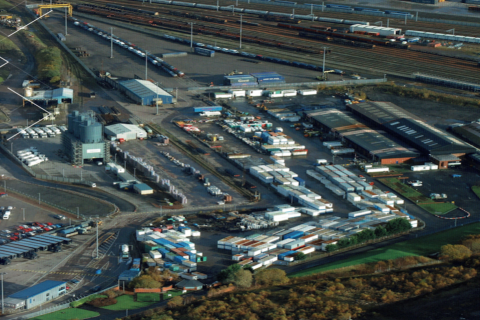UK figures show the end of coal
Coal traffic has all but died out on the rail freight routes of the UK, marking an end to the industrial era that gave birth to the railway age. This was shown by the latest rail freight usage and performance figures by the UK Office of Rail and Road.
The numbers of the independent government-appointed agency and watchdog, issued 17 December, show that the shift away from fossil fuel power generation is almost complete. Coal traffic, the very purpose of the nineteenth-century railway boom, is at an all-time low, with only 0.08 billion net tonne kilometres moved in 2019-20 Q2 (July to September).
King Coal
ORR stats highlight the precipitous fall of King Coal. As recently as 2015, the quarterly figure was nearly 2 billion net tonne kilometres moved. Now, at the end of 2019, the princes vying to take the throne are, predictably, intermodal, and a steady rise in construction materials.
Coal traffic had been riding twenty years of prosperity, as the UK mining industry contracted and closed. With the country’s power stations, now marooned on the abandoned British coalfields, imports required lengthy movements from ports, to keep them fuelled and producing. That fleet has now been largely decommissioned, with iconic chimneys and cooling towers brought crashing down, and their delivery loops abandoned, rendering coal trains redundant.
Construction rising
However, while tonnage may be down for the sector – by 3 per cent, year on year – there is no let up in the rail freight sector. Bulk cargo remains buoyed up by a steady increase in construction materials. Back in 2015, when coal dwarfed all other traffic, construction materials accounted for roundly one billion net tonne kilometres moved.
That figure is now 20 per cent greater, and shows no sign of slipping back, as more projects come on stream, particularly in the south east of England. With the new UK government pledged to boost the post-Brexit economy, particularly in the under-performing north of England, the rail freight industry is gearing up to serve a new area of demand.
Box fresh container traffic
The real monarch of freight wears a square crown. The ORR analysis shows that intermodal boxes recorded a highest ever total for a quarter, with 1.75 billion net tonne kilometres moved. A number of factors are contributing to the inexorable rise of container traffic. Britain’s installed intermodal handling facilities continue to grow – with centres like Eurocentral in Scotland and iPortRail in Doncaster receiving more loads, month on month.
Environmental pressures too are persuading shippers to consider modal shift, away from road to rail. Increased reliability is also making that more attractive to customers.
On time and cleaner too
Timekeeping figures in this quarter also make pleasing reading. The freight sector has returned performance statistics that would be the envy of many passenger operators in the UK. Over the entire country, freight managed an average of 93.5 per cent of trains arriving within 15 minutes of their scheduled arrival time. That translated into a rather more prosaic delay metric of 10.3 minutes per 100 train kilometres. The ORR statisticians say that is an impressive 11 per cent reduction in delays compared to the same period last year.
All that has been achieved while at the same time the sector has been cleaning up its act. Freight has almost completely stopped delivering the most polluting of fossil fuels, while cutting its own use as well. Emissions per freight tonne km are down by over four percent since 2017-18 – though this compares with more than ten per cent in the passenger sector, which has been better able to take advantage of electrification and fleet renewals. Figures do not however take into account the modal shift benefits accrued by transfer to rail freight.
Raw tonnage may be down, but activity continues to grow. As we are about to enter the first post-coal decade of the 21st century, we may also be on the cusp of a new, cleaner, leaner, rail freight age.
You just read one of our premium articles free of charge
Want full access? Take advantage of our exclusive offer




